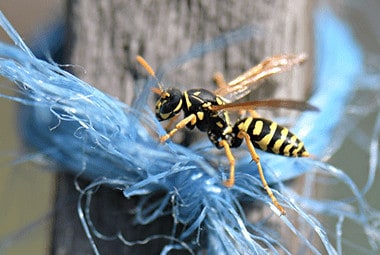When it comes to stinging insects, few are as aggressive as the yellow jacket. These wasps can sting multiple times, fiercely protect their nests, and even pursue their targets relentlessly. Yellow jacket swarms are known to navigate around obstacles and hover above water, waiting to strike.
Yellow jackets often build ground nests, which can create unique hazards. Vibrations from a lawnmower or disturbing a bush with roots near their nest can provoke an aggressive response.
To make matters worse, yellow jackets are attracted to a variety of foods, including both sweets and meats. This makes them frequent uninvited guests at backyard cookouts, picnics, and gatherings with food on display. They’re not picky eaters either – yellow jackets can just as easily scavenge from a trash can as feast on a spread of BBQ and desserts.
Why Are Yellow Jackets On My Property?
These insects are drawn to nectar and sugary liquids. If you have lots of flowers, you could be attracting yellow jackets. If you are in the habit of leaving drinks outside, this could be an attractant as well. Open trash cans are known for attracting all sorts of insects as well as animal pests. Also, things such as pet food left out, or leftover fruit from fruit trees could draw these dangerous pests in. They’re also drawn to sources of protein, including pests such as caterpillars, spiders, and flies.
How Weather Affects Yellow Jackets:
In the battle to ward off stings from this pest, it is important to understand the enemy. Since the weather has a big impact on yellow jackets, we figure that is a good place to start. Here are a few ways seasonal weather affects yellow jackets.
Winter
- Freezing weather kills yellow jackets.
- In winter, a nest will only survive if it is in a temperature-controlled environment, like an attic space, garage, heated shed, or a wall void. When a yellow jacket nest survives the winter, the nest continues to grow. If not dealt with, it is possible to get a super nest of these wasps.
Spring
- Cold snaps in the spring are the death of yellow jackets, quite literally. It may not be fun for us, but those unexpected cold spikes can have a dramatic effect on yellow jacket populations, not just in spring, but for the rest of the year. So, the next time you’re tempted to complain about a cold day in spring, remember that it is helping to reduce the threat of these stinging pests.
Summer
- Typically, the summer is the time when yellow jackets thrive. Hot weather gives yellow jackets more energy to zip around and search for food. It is also beneficial to all of the critters that yellow jackets like to eat. When there is an abundance of food sources, yellow jackets are happy, and a happy yellow jacket is less likely to sting.
- Warm summer days bring humans outside. When humans come out, they often find a place to cook some food. This can provide food for yellow jackets directly, or indirectly, by way of discarded food and trash.
- A weather condition that yellow jackets don’t like is excessive rain. Rainwater can fill a hole in the ground and drive wasps out of a nest. It also fills holes that are potential nesting locations, which can drive yellow jackets into man-made structures.
- High humidity during the summer can make it harder for yellow jackets to get around and forage for food. This can make them aggressive and more apt to sting humans. It is best to steer clear of yellow jackets on a muggy day.
- Drought conditions are the best for yellow jackets. It increases nesting options, reduces the risk of a nest evacuation, and makes it easier for these wasps to go hunting for a meal.
Fall
- As the cold weather of winter approaches, it drives yellow jackets into a feeding frenzy. This can bring them into contact with humans during the last few warm afternoons of fall. It can also cause them to explore holes in door and window screens.
The Problem With Yellow Jackets
- Yellow jackets tend to sting, and not only are their stings painful, they can be dangerous to certain people. Allergic reaction to yellow jacket stings can be fatal.
- Yellow jackets hide their nests in the ground. When a person (or pet) goes near a nest and creates vibrations, this can bring about a swarm of angry yellow jackets that are ready to sting over and over to protect their home. This can even happen from a distance, such as when someone is mowing the lawn and vibrations travel through the ground.
- Yellow jackets will give chase, even around obstacles, to reach their victim. Jumping into water is futile since they will stick around longer than a person can hold their breath.
Yellow Jacket Prevention Strategies
- Have nests removed. Since it is dangerous to try to remove yellow jacket nests without the proper knowledge and equipment, it is best to call upon the expertise of a professional pest control company.
- Remove sources of protein. If your yard has protein sources, including other insects, reducing these insects will reduce the chances of having yellow jackets.
- Remove sweet things.
- Cover trash with tight-fitting lids.
- Cover crevices and voids in your home where nests could be established.
- Remove yard debris where nests could be established.
When Do Yellow Jackets Die?:
As mentioned above, Yellow Jackets are very susceptible to the weather and they will do anything they can to find a home that is safe and warm. Yellow Jackets will only die from weather exposure when there’s been 5-7 days of weather under 45 degrees in a row.
Yellow Jacket Pest Control
When it comes to dealing with a yellow jacket nest, in any season, it is best to call a professional. These wasps get very aggressive when their nest is threatened and nests built by yellow jackets can be in hard to get at locations.
If you’re in our St. Louis, Kansas City, or anywhere in our service area, let Rottler Pest & Lawn Solutions deal with this problem. Our team of pest professionals will make sure all those wasps are fully removed from your property, without any danger to you, your family, or your pets. For more information or to set up service, contact us today. We look forward to adding you to our ever-growing list of happy customers.


